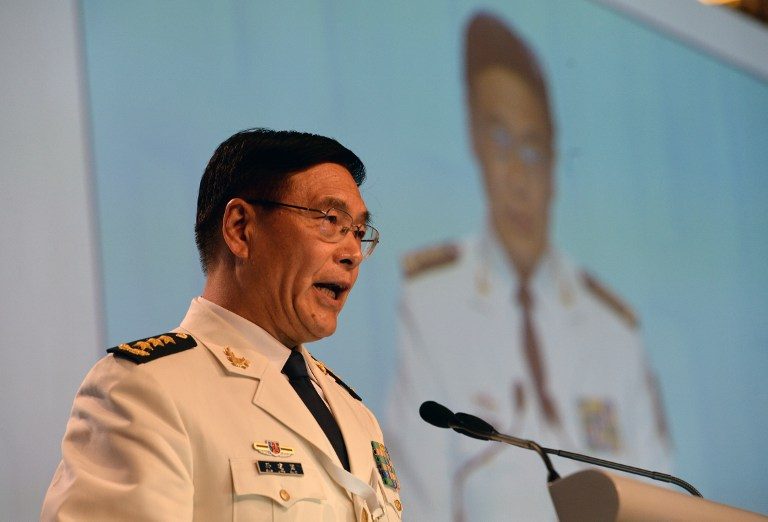SUMMARY
This is AI generated summarization, which may have errors. For context, always refer to the full article.

SINGAPORE (4th UPDATE) – An Asian security summit ended in discord Sunday, June 5, after China denounced US “provocations” in the South China Sea and declared it does not fear trouble in the contested waters.
“The South China Sea issue has become overheated because of the provocations of certain countries for their own selfish interests,” Admiral Sun Jianguo told an annual forum in Singapore.
Sun, who stressed China’s desire for a peaceful solution, spoke one day after US Defense Secretary Ashton Carter said any Chinese construction on an islet near the Philippines would prompt unspecified “actions” by the United States and other nations.
On a visit to Mongolia Sunday, US Secretary of State John Kerry also warned Beijing against setting up an air defense identification zone over the disputed waters.
“We would consider an ADIZ, an ADIZ zone, over portions of the South China Sea as a provocative and destabilizing act, which would automatically raise tensions and call into serious question China’s commitment to diplomatically manage the territorial disputes of the South China Sea,” Kerry said.
“We believe that it is critical that no country move unilaterally to militarize the region,” he added.
His remarks came on the eve of a US-China dialogue in Beijing and after Hong Kong’s South China Morning Post (SCMP) newspaper cited Chinese army sources as saying Beijing was mulling such a zone.
China claims nearly all of the sea despite competing claims by several Southeast Asian neighbours, and has pressed its claims by rapidly building artificial islands suitable for military use.
Washington has responded by sending warships close to Chinese-claimed reefs, angering Beijing.
Rhetoric has escalated ahead of a decision at the Permanent Court of Arbitration in The Hague on a case brought by the Philippines, a longtime US ally and former colony, against China, which says it will not recognize any ruling.
The Chinese admiral said US naval and air patrols in the sea were a display of “military muscles” and China was being forced to “accept and honor” the tribunal’s ruling.
“China firmly opposes such behavior. We do not make trouble but we have no fear of trouble,” Sun, the leader of the Chinese delegation in Singapore, said in prepared remarks.
Carter had left Singapore by the time Sun made his speech.
Sun also took exception to Carter’s statement on Saturday that Beijing risks building a “Great Wall of self-isolation” with its military expansion.
China ‘not isolated’
“We were not isolated in the past. We’re not isolated, and we will not be isolated in the future. Actually I am worried some people and countries are still looking at China with a Cold War mentality and prejudice,” the Chinese admiral said in response to questions from other delegates.
Apparently referring to the United States and the Philippines, Sun said “some hegemonic countries have empowered small countries to make provocations against big countries.”
The SCMP has reported that China plans to establish an outpost on Scarborough Shoal 230 kilometers (140 miles) off the Philippines which considers it part of its exclusive economic zone.
According to a Pentagon report, China has added more than 3,200 acres (1,295 hectares) of land to the 7 islets it occupies in the Spratlys, a separate island chain from Scarborough.
Manila says China took effective control of Scarborough Shoal in 2012, stationing patrol vessels and shooing away Filipino fishermen.
Carter declined to elaborate when pressed on Saturday over what “actions” Washington might take. But the Pentagon chief proposed stronger bilateral security cooperation with China to reduce the risk of a mishap.
French Defense Minister Jean-Yves Le Drian told the forum that the European Union had a stake in maintaining freedom of shipping and navigation in the South China Sea, and said he would speak to his counterparts on the issue.
Brunei, Malaysia, Vietnam, and Taiwan also have competing claims in the sea.
Beijing’s territorial claims, based on controversial historical records, have pitted it against the United States, which has conducted patrols near Chinese-held islands to press for “freedom of navigation” in the waterway.
Pentagon officials say two Chinese fighters last month conducted an “unsafe” intercept of a US spy plane in international airspace over the South China Sea. – Matthew Mohan and Elizabeth Law, AFP / Rappler.com
Add a comment
How does this make you feel?
There are no comments yet. Add your comment to start the conversation.